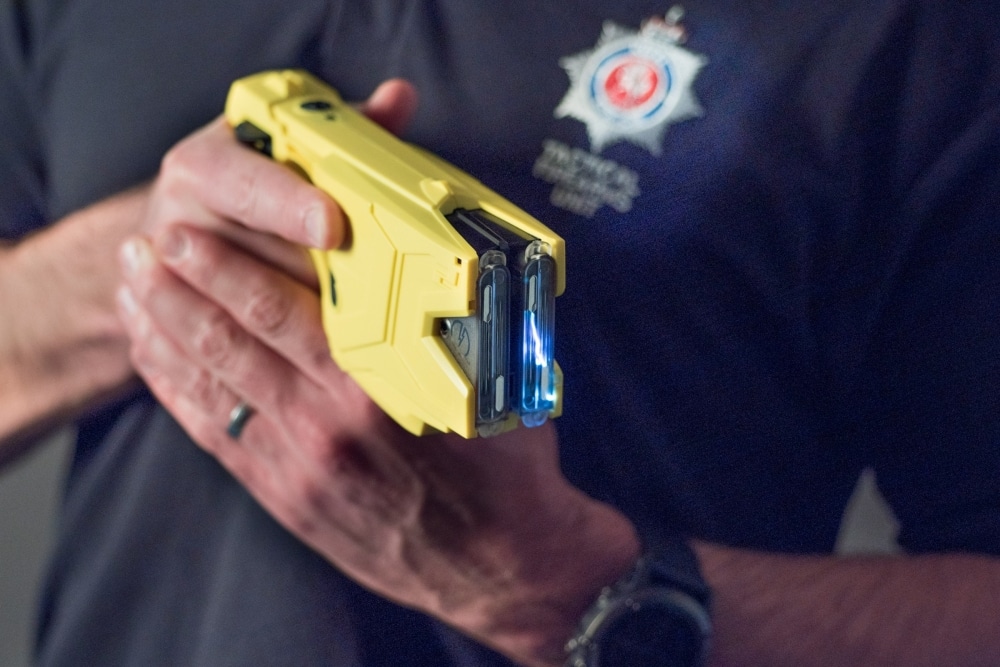Violent incidents involving knives in the county have increased at the fastest rate in the whole of the country, more than doubling over the last eight years, with the number of offences rising from 346 to 873.
As reported in the Times last week, Tunbridge Wells is not immune to the ‘scourge’ of knife crime, with rates doubling in the borough over the last 12 months.
Kent’s Chief Constable, Alan Pughsley, said: “Violent crime and assaults on officers are rising, and we are dealing with a criminal element who think nothing of carrying – and using – the most appalling knives against each other, against people they wish to rob and victimise, and ultimately against those that stand between them and their victims – the police.”
Currently, 330 officers in Kent are trained to use Tasers – also known as Conductive Energy Devices [CEDs] – which fire a pair of electrified probes to incapacitate suspects when needed.
That number is expected to increase to 1,500 Tasers as the force allocates £750,000 for additional training.
The opt-in scheme will see any officer, including Specials or probationers, able to be trained to carry the non-lethal weapon.
Until now, the force has had specially trained teams armed with Tasers, and they will remain in place.
Mr Pughsley added: “I have steadily increased the availability of Tasers to officers in roles that meet this sort of aggression and violence head on.
“The deployment of more Taser-trained officers enhances our ability to robustly deal with incidents involving bladed weapons and make the public and officers safer.
“I am firmly of the view that it is now the right thing to do.”
To carry a Taser, all officers will have to successfully complete the force’s rigorous training and accreditation programme. Guidance states the weapon must be used proportionately and reasonably. No officer will be mandated to carry a Taser.
Between 2010 and 2018, there was a 152 per cent increase in recorded knife crimes in Kent, the largest in England and Wales.
Home Office figures show there were 1,112 assaults on police officers in 2017-18. Last year, the Assaults on Emergency Workers (Offences) Act came into force, which increases prison sentences for people who assault emergency workers from six months to a year.
Chief Constable Pughsley said: “We are recruiting and deploying more new officers thanks to increases in funding from the Police & Crime Commissioner [Matthew Scott].
“But I am increasingly of the view that it isn’t enough when we are dealing with violent county lines organised crime.”
‘County lines’ offences are defined as criminals from major cities expanding their drug networks to other areas of the country.
Typically, vulnerable children and adults are recruited in cities to transport cash and drugs, meaning that the ringleaders are less likely to be detected or caught.
Gangs often set up a base in small towns and rural areas for a short time, taking over the home of a vulnerable person in a practice known as ‘cuckooing’.
Thirty-eight arrests were made across the county in early-morning raids on March 20 as part of a continuing crackdown on knife crime and the culture around it.
Eleven knives were seized by officers, including a Samurai-style sword and a crossbow, as well as quantities of heroin and crack cocaine, after 33 warrants were served.
Mr Pughsley commented: “There is absolutely no place in Kent for knife crime or the culture around it.
“These warrants demonstrate we are taking a robust, proactive and zero-tolerance approach to people who choose to break the law, and this will continue in the coming weeks.”
Since the operation began on March 11, more than 250 weapons have been confiscated and 95 arrests made.
Plain clothed and uniformed officers will continue to be targeting those suspected to be involved in organised crime involving knives and drugs in the coming weeks.
Mr Pughsley said: “We are committed to keeping the county safe. Aside from our enforcement work, we work closely with local authorities and schools to educate people on the dangers of this type of offending, and to challenge the mistaken belief that carrying a knife will give you added protection.
“If you carry a knife you are more likely to become a victim, and can also expect to be arrested and brought before the courts.”
In the borough of Tunbridge Wells, 30 incidents of knife-related offences were recorded in 2017-18, compared to 14 during the previous 12 months.








